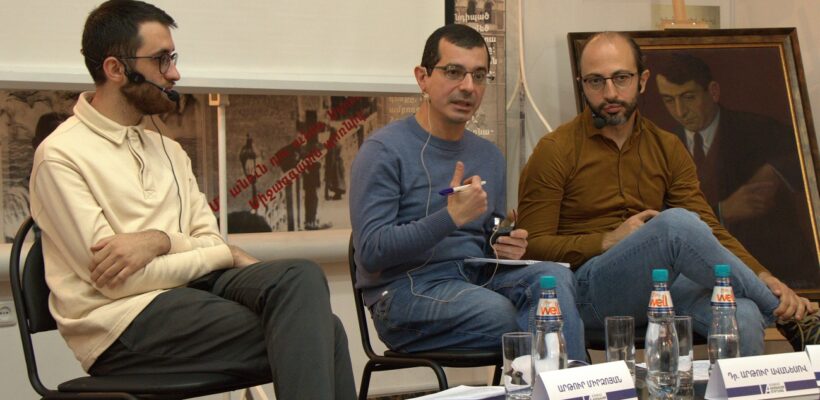
AUA Faculty Present on Armenian Literature and Memory
2 min readYEREVAN, Armenia — On November 15, Drs. Vahram Danielyan and Artur Mirzoyan, lecturers of Armenian language and literature at the American University of Armenia (AUA), participated in a panel discussion on Soviet memory and Armenian literature at the closing conference of the Cultural Memory: Society Past and Its Reflection in Literature project, jointly implemented by the Konrad-Adenauer-Stiftung and ARI Literature Foundation.
On the topic of “Literature Textbooks as a Tool for Creating Homo-Soveticus: Armenian Literature in Soviet Schools,” Drs. Danielyan and Mirzoyan discussed the establishment of the Soviet system in Armenia, a notable historical and political period that has been examined by many from different perspectives.
They spoke about the formation of Soviet Armenia and the development of its citizenry, particularly focusing on the school education system and the state curricula for teaching Armenian literature. They considered both the teaching of literature in Soviet Armenia as well as public perceptions of literature at the time. The lecturers also evaluated how literature reflected the changes occurring in Soviet Armenia.
Dr. Danielyan mentioned that some writers stopped teaching in the state system due to guidelines imposed on writers and teachers.
He specifically cited the early 1900s literature textbook by Yeghishe Charents, in which the author had included the works of fellow contemporary writers, many of whom are not widely remembered today.
Dr. Mirzoyan discussed Charents as a national hero in literature through his writings in the 1920s until the early 1940s, after which his works were no longer covered in the national curriculum before being reintroduced in the 1950s.
The panel discussion was moderated by Dr. Artur Avanesov, lecturer of music at AUA.
Founded in 1991, the American University of Armenia (AUA) is a private, independent university located in Yerevan, Armenia, affiliated with the University of California, and accredited by the WASC Senior College and University Commission in the United States. AUA provides local and international students with Western-style education through top-quality undergraduate, graduate, and certificate programs, promotes research and innovation, encourages civic engagement and community service, and fosters democratic values.
